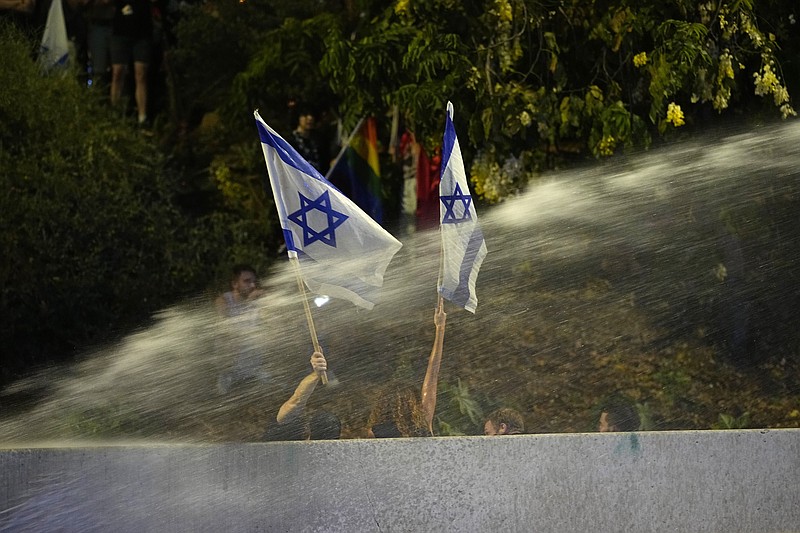TEL AVIV -- A showdown between masses of Israeli protesters and far-right leaders over a plan to limit the Supreme Court's power escalated Sunday as thousands of military reservists threatened to refuse their volunteer service if the legislation is ratified, and Prime Minister Benjamin Netanyahu underwent an unannounced heart procedure early Sunday when a pacemaker was implanted. He was still hospitalized Sunday evening, adding to the drama of the mounting crisis.
Netanyahu's sudden health crisis injected further uncertainty into a process already fraught with instability and political chaos. The fight over the government's bid to overhaul the judiciary -- which, according to the original plans, included curbing the top court's oversight powers and granting coalition lawmakers more authority to appoint judges -- has roiled Israel for months.
The proposal has drawn weekly protests across the country, as well as searing criticism from Israel's top security officials. The Knesset is set to vote on the legislation today. Opponents of the bill say it will undo Israel's fragile democracy, which has no constitution. The Supreme Court is widely seen as an institution that upholds civil rights and the rule of law.
In Jerusalem, thousands of demonstrators camped outside the Knesset building, and thousands more linked arms to form a human chain from the Western Wall in the Old City to the parliament, calling on lawmakers to halt the bill's passage until a consensus is reached.
But Netanyahu, recovering from surgery, remained defiant. "We are continuing efforts to complete the legislation," he said in a video statement broadcast Sunday afternoon.
Justice Minister Yariv Levin, a key proponent of the bill, was appointed as Netanyahu's stand-in while he was under sedation. Another key backer of the legislation, Simcha Rothman, told the Knesset on Sunday that the bill will "make Israel democratic again."
The far-right government and its supporters say the overhaul will give lawmakers greater freedom to implement policy -- including more benefits for Israel's ultra-Orthodox minority and a de facto annexation of the West Bank, the land Palestinians envision as part of their future state.
But Netanyahu's health scare kept him from attending critical security and defense meetings Sunday as tensions ran high ahead of the vote. He was also hospitalized July 15 after a fainting spell, leading doctors to fit him with a subcutaneous heart monitor.
The opposition of senior security officials and the military's rank-and-file perhaps poses the most serious threat to the legislation -- with some warning that the divisions could weaken Israel's preparedness in a region beset by conflict.
More than 10,000 reservists from dozens of military units said Saturday that they would not report for duty if the legislation passes. On Friday, 500 military intelligence reservists and more than 1,100 air force reservists made similar announcements.
Gallery: Israelis protest judicial overhaul plan
"This is where we draw the line. We serve the kingdom, not the king," said Eyal Neve, a leader of the protest group whose members include active-duty and former soldiers from the Israeli military's most elite units. "If you want us on your side, we who have served under right- and left-wing governments, we are calling on you to stop the legislation."
In a rare statement Sunday, military chief Herzi Halevi warned that despite its best efforts to stay out of the debate, the army has already been damaged by the polarized landscape.
"Without the best of our best serving in the army, we will not continue to exist as a country in our region," he said, adding that the intense divide "in Israeli society has caught the army up in it, and the army's cohesion has been damaged."
Since its founding, the Israel Defense Forces, Israel's relatively tiny national army, has relied on reserve volunteers to maintain its readiness. Its three-part structure relies on a small corps of professional officers and instructors to train a constantly replenished main body of young draftees -- 32 months of military service is mandatory for most Israeli men; 24 months for most Israeli women. Reservists step in during wartime.
"The professionals and the conscripts are there to hold to the line, but you need the reservists to win the war," said Chuck Freilich, a former deputy head of Israel's National Security Council and a senior fellow at the Institute for National Security Studies in Tel Aviv.

